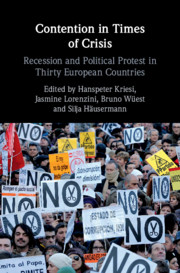Book contents
- Contention in Times of Crisis
- Contention in Times of Crisis
- Copyright page
- Contents
- Figures
- Tables
- Contributors
- Preface and Acknowledgements
- Part I A Study of Protest in Thirty European Countries
- 1 Introduction
- 2 Design and Methods of Semi-automated Protest Event Analysis
- 3 External Validation of Protest Event Analysis
- Part II Trends in Protest in the Great Recession
- Part III Sources of Protest
- Part IV Interaction Between Convention and Contention
- References
- Index
3 - External Validation of Protest Event Analysis
from Part I - A Study of Protest in Thirty European Countries
Published online by Cambridge University Press: 13 August 2020
- Contention in Times of Crisis
- Contention in Times of Crisis
- Copyright page
- Contents
- Figures
- Tables
- Contributors
- Preface and Acknowledgements
- Part I A Study of Protest in Thirty European Countries
- 1 Introduction
- 2 Design and Methods of Semi-automated Protest Event Analysis
- 3 External Validation of Protest Event Analysis
- Part II Trends in Protest in the Great Recession
- Part III Sources of Protest
- Part IV Interaction Between Convention and Contention
- References
- Index
Summary
Protest Event Analysis is attractive to social movement scholars because it is an unobtrusive technique that can cope with a large amount of unstructured data. However, it has also drawn some major criticisms such as its susceptibility to reporting bias. This chapter sets out to engage with these criticisms by discussing and defending our choice to rely on international news agencies publishing in English and by identifying the strengths and weaknesses of our dataset compared to two external datasets. On the one hand, we find that our dataset is more precise than the Integrated Crisis Early Warning System (ICEWS) data, which suffers from duplicated events and misclassifications of the protest form. As opposed to the ICEWS data, our dataset actually reveals the major waves of demonstrations across Europe. On the other hand, we evaluate our semi-automatically compiled data with help of data derived manually from national newspaper articles and news reports for Spain, Germany, the Netherlands, the UK, Hungary, and Poland. This comparison shows that our data have a slight tendency in the direction of covering larger events and events taking place in the capital more than other events.
Information
- Type
- Chapter
- Information
- Contention in Times of CrisisRecession and Political Protest in Thirty European Countries, pp. 49 - 74Publisher: Cambridge University PressPrint publication year: 2020
Accessibility standard: Unknown
Why this information is here
This section outlines the accessibility features of this content - including support for screen readers, full keyboard navigation and high-contrast display options. This may not be relevant for you.Accessibility Information
- 7
- Cited by
